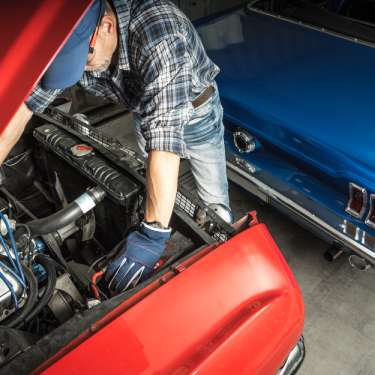
One might consider classic cars and electric vehicles (EVs) to be on opposite ends of the spectrum of automobiles, but they're coming together more than ever. More and more drivers are converting their classic cars to EVs, but is it worth it? We’ll answer that question and more below as we explain classic car EV conversions and their pros and cons.
Classic Car EV Conversion Explained
Converting a classic car to an EV means replacing the traditional internal combustion engine with an electric motor and battery system. This transformation allows your vintage vehicle to run cleanly and efficiently without relying on fossil fuels.
While it may seem like an extensive overhaul and complex process, advancements in EV technology have made these conversions more feasible and attractive. So, is an EV conversion right for you and your classic?
The Pros of Classic Car EV Conversion
Easier Maintenance Than an Old, Traditional Engine
One significant advantage of converting a classic car to an EV is the reduced maintenance required. Traditional internal combustion engines involve numerous moving parts that can wear out over time, leading to frequent repairs and upkeep.
Electric motors have fewer components, which translates to less maintenance and a more reliable driving experience. Classic car enthusiasts who want to spend more time on the road and less time in the garage can consider this benefit alone as a compelling reason to consider an EV conversion.
Make Your Car More Sustainable
If you’re looking for ways to make your vintage vehicle more sustainable, you can’t do any better than an EV conversion. By replacing a gas-guzzling engine with an electric motor, you can significantly reduce your classic car's carbon emissions. This eco-friendly transformation aligns with the growing emphasis on environmental responsibility and sustainability.
And there's no doubt that with growing investments in EV infrastructure, like charging stations, owning an EV will become much easier and more convenient than ever. For classic car enthusiasts who are passionate about preserving both their vehicles and the planet, EV conversions offer a conscious and forward-thinking solution.
The Cons of Converting Your Classic to an EV
The Expense of It All
The biggest consideration when deciding whether converting your classic car to an EV is worth it is the expense. While the task is simpler and more affordable than it used to be, there’s no doubt that an EV conversion isn’t cheap. While some enthusiasts view this investment as worthwhile for the long-term benefits, others may find the initial price tag prohibitive.
Lose That Classic Engine Sound and Feel
One undeniable trade-off of converting a classic car to an EV is losing the iconic sound and feel of a traditional engine. For many enthusiasts, the distinctive roar of a vintage engine and the tactile feedback of manual controls are integral to the classic car experience. This loss of sensory connection can be a significant drawback for purists who cherish the nostalgic aspects of their vintage rides.
The Classic EV Choice Is Yours
We hope our guide has clarified the key factors for drivers considering an EV conversion for their classic car. Weigh the pros and cons of your wants and desires for your classic car and make the best decision for you.
Bio: Casey is a passionate copyeditor highly motivated to provide compelling SEO content in the digital marketing space. Her expertise includes a vast range of industries from highly technical, consumer, and lifestyle-based, with an emphasis on attention to detail and readability.




















